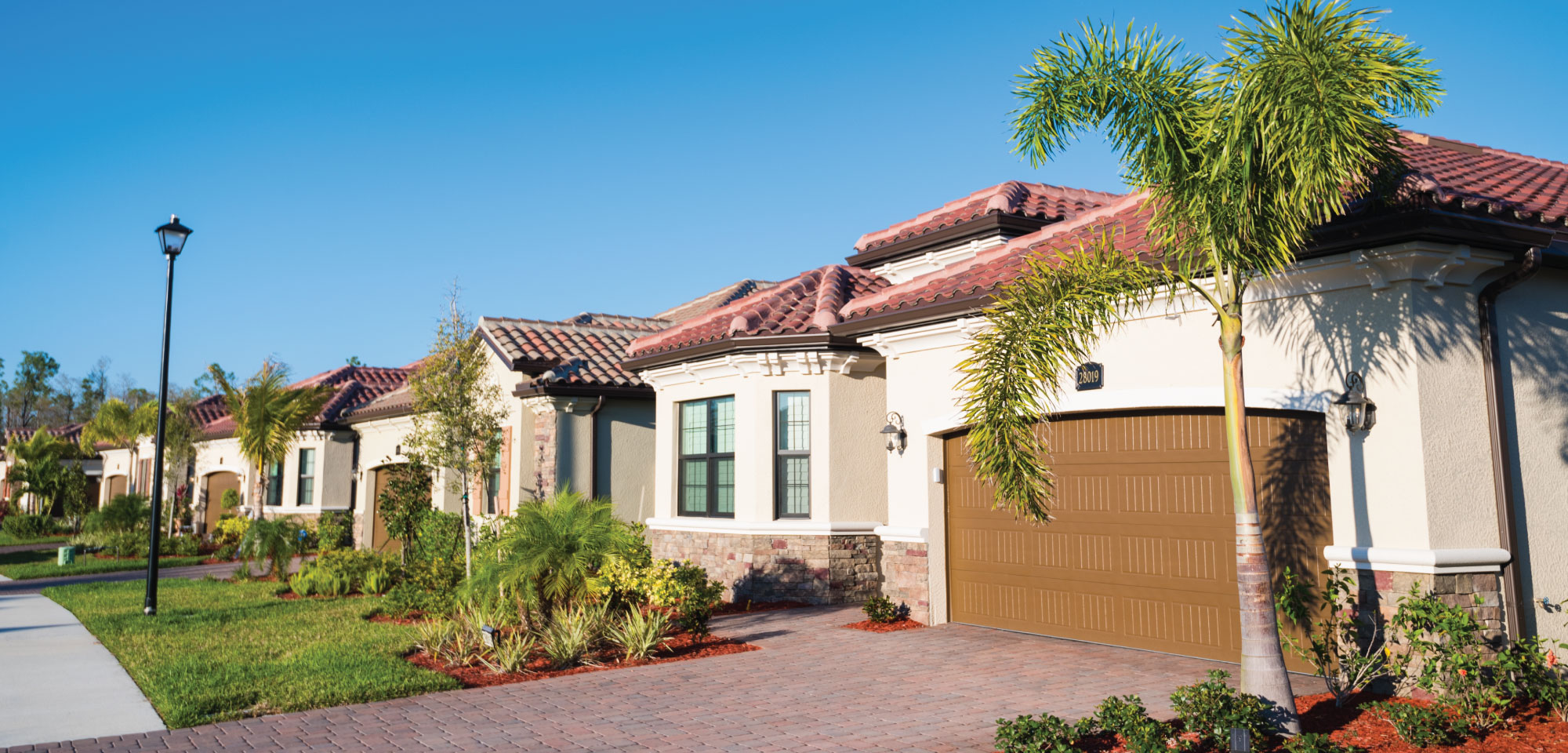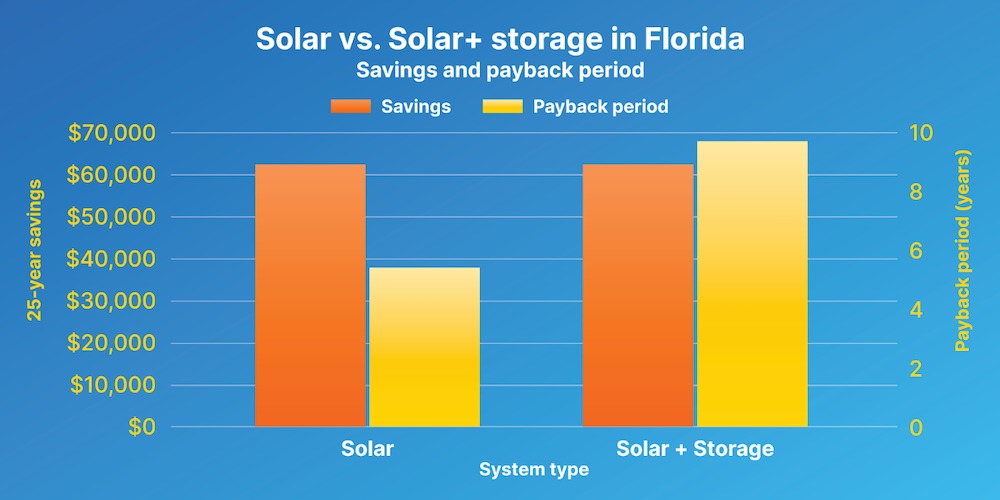Updated 1 year ago
Solar batteries in Florida: Should residents invest in one?
Written by
Jamie Smith

Find out what solar panels cost in your area
Florida is a great place in the U.S. to invest in solar panels for your home. With good net metering, plenty of sunshine, and Florida’s average cost of electricity, it’s become one of the most popular solar states in the country.
When people invest in solar, they may be curious whether they want to add a solar battery. Solar batteries have become increasingly popular over the years, and most homeowners aren’t really aware of the benefits of having one or if they’re even worth the cost.
Solar batteries can power essential appliances in a home during a power outage. Considering that Florida experiences the most hurricanes and tropical storms in the country, batteries could be a huge benefit! The investment could be worthwhile if you strictly install a battery because you want backup power. But, it might not pan out if you look at the financial side.
We have the full breakdown of solar batteries and if they’re worth purchasing in the Sunshine State.
Key takeaways
-
A solar battery stores excess energy generated by your solar panels that you can use to power your home instead of using the grid.
-
Solar batteries in Florida will typically cost around $15,000, or $10,500, after the federal tax credit.
-
Most Floridians would only need one or two batteries to cover nighttime electricity usage and power essential electric loads during a power outage.
-
Home batteries installed in Florida will not save additional money on your electricity bills but do provide the benefit of backup power during a grid failure.
How does a solar battery system work?
Before investing in a solar battery, you might want to know how it works!
In a nutshell, solar batteries store the excess energy that your solar panels produce that your home doesn’t immediately use so that it can be used later on. Without a battery, any solar energy your solar panels produce that your home doesn’t use would be sent to the electric grid. The following video shows how a solar plus storage system works:
Home battery systems can also be installed without solar panels and charge from the grid. Remember that installing a standalone battery is just like adding another appliance - it will increase your electricity bill to charge it. But you will still get to keep your lights on during a power outage.
How much does a solar battery system cost in Florida in 2025?
We’ll keep it real with you – a reliable solar battery can cost you a pretty penny.
A home battery system will usually cost at least $15,000. Most homeowners today are looking for a full energy storage system with an inverter, a gateway, and a lithium-ion battery. The following table outlines the price of some popular solar batteries in Florida:
Battery | Usable storage capacity | Estimated price before incentives* |
|---|---|---|
13.5 kWh | $15,500 | |
10.28 kWh | $15,000 | |
9.7 kWh | $14,500 | |
10 kWh | $15,300 |
*Estimated installation cost included
Several factors will impact the total cost of a solar battery installation:
The battery manufacturer
The type of battery
How many are installed
Labor costs
Incentives and rebates
You can get a better idea of how much installing a solar battery will cost you by getting quotes from local installers. We recommend getting at least three to get the best deal possible.
Does Florida have any solar battery rebates or incentives?
Unfortunately, Florida offers no rebates or incentives for owning a battery storage system. Some local utility companies, like Jacksonville Electric Authority (JEA), used to offer a $4,000 upfront rebate program for homeowners who install a solar battery, but it has since expired.
However, energy storage installations qualify for a 30% federal battery tax credit. You can receive the tax credit if the battery is installed on its own or paired with solar panels. The incentive is worth 30% of the total installation costs. So, if a Tesla Powerwall costs for $15,500, you could receive a tax credit of $4,650.
How many batteries do you need in Florida?
Most Florida homeowners can get by with one to two batteries or between 10 and 25 kWh of storage capacity. This can power your essential loads, like your fridge, outlets, and lights, during a power outage for at least 10 hours and maybe up to 24. If your battery system is hooked up to solar panels, you could continue to recharge your batteries during a power outage and potentially last days without the grid.
But the actual amount of storage you need will depend on what you’re using your battery for. If you want to run powerful appliances like your HVAC system, you will need more than one or two batteries to keep it going. If you’re fine with running just a few essentials in the event of an overnight blackout, you can probably stick with just one battery. Your solar installer can help find what size storage system will meet your needs.
You can use our solar calculator to see how many solar batteries you need and how much you can expect to spend to install them.
What are the pros and cons of having a solar battery in Florida?
Solar batteries have a lot of benefits, but how exactly they can help you can depend on where you live. Florida’s extreme weather could lead you to believe that battery backup is a no-brainer. But you also need to consider economics. Here are the pros and cons of installing a solar battery in Florida:
Pros
-
Backup power during grid outages
-
Energy independence
-
Low maintenance
Cons
-
Expensive
-
Don't save you extra money
Pros of home batteries in Florida
Back up power during grid outages
Contrary to popular belief, solar panels alone do not keep your lights on during a power outage – they must be paired with a solar battery. Solar batteries can give homeowners peace of mind that essential items can still be up and running in the event of a blackout.
In fact, solar batteries can typically power the basics in your home for at least 24 hours, but this could be longer depending on how many batteries you have and if you are conservative with what you use.
Because of frequent tropical storms and hurricanes, access to backup power is more important to Floridians than to many other Americans. If your power frequently goes out during hurricane season, a battery system may be worth it for your home in Florida, even with the high price tag.
Energy independence
When you pair a home battery with solar panels, you can maximize the amount of solar energy your home runs on and rely less on the utility grid. Instead of depending on the grid that uses foreign oil and natural gas to power your home, you can use energy generated on your roof.
Although you’ll likely have to use your utility if you don’t have enough energy stored in your battery and you’ll have to pay monthly fees for being connected to the grid, solar plus storage systems let you take your energy into your own hands.
Low maintenance
You might think that having a battery and solar installation would be more of a hassle – well, think again!
Lithium-ion solar batteries require very little maintenance once installed. When it comes to a power outage, you don’t have to worry about refueling or turning on your generator. Most energy storage systems have smart monitors that automatically start running your home on battery power when the grid goes down. No fueling up necessary!
Cons of home batteries in Florida
They don’t save you extra money
Adding solar batteries to your home will not save you any extra money on your electricity bills in Florida.
In Florida, the state’s largest utilities offer full retail net metering. Because of this, solar batteries can’t provide homeowners with any monetary value; the solar panels are the source of all the savings. Solar energy is worth the full retail rate, whether sent to the grid or stored in a home battery.
This means you’ll add a $15,000 battery that provides no additional electricity bill savings. Your solar payback period goes from just 5.5 years with no battery to about 9.5 years with a battery. Your battery will be nearing the end of its warrantied life by the time it pays for itself.
To give you a better idea, the chart below shows a side-by-side comparison of what your savings and payback period will look like with just a solar system versus a solar and storage system combined.

A solar system with or without battery storage will both save you about $60,000 over 25-years, but the battery system will take an additional 5 years to pay itself off.
They’re expensive
After installation, solar batteries will run your pockets about $15,000. When you pair them with solar panels, you can find yourself with a grand total upwards of $35,000 before any incentives are factored in.
Combine the high upfront cost with the fact that batteries can’t save you extra money in Florida, and the financials don’t really pan out.
Unless you live in an area with a major solar battery rebate or incentive program, it will take longer to break even on the system than if you just had solar panels installed. Also, if you aren’t a customer of the state’s major investor-owned utilities, solar owners may be billed differently, resulting in slightly better savings from batteries.
Florida residents: Should you invest in a solar battery?
Bottom line: If you’ve experienced multiple power outages and want a backup power source for the future, you should consider installing a home battery system. If you want to save money on your electricity bill, a battery isn’t necessary in Florida; you can just stick with solar.
Because Florida experiences a lot of extreme weather events, the value of having backup power may outweigh the expensive upfront cost for some homeowners. However, it’s important to keep in mind that installing a battery in Florida won’t save you additional money on your electricity bill if you’re a customer of the state’s major utility companies.
We recommend you contact your local solar company to see if a solar battery storage system is suitable for your home in Florida. In the meantime, you can use our solar calculator to learn more about how much a battery will cost you!
Jamie is a Content Writer and researcher at SolarReviews. A recent graduate of La Salle University in Philadelphia, Jamie earned her B.S. in communications with a concentration in journalism, mass media, and public relations. Jamie has previously worked at a marketing company where she had the opportunity to highlight and promote small business owners through long-form stories and interviews. With a deep-rooted passion for creativity, Jamie stri...
Learn more about Jamie Smith